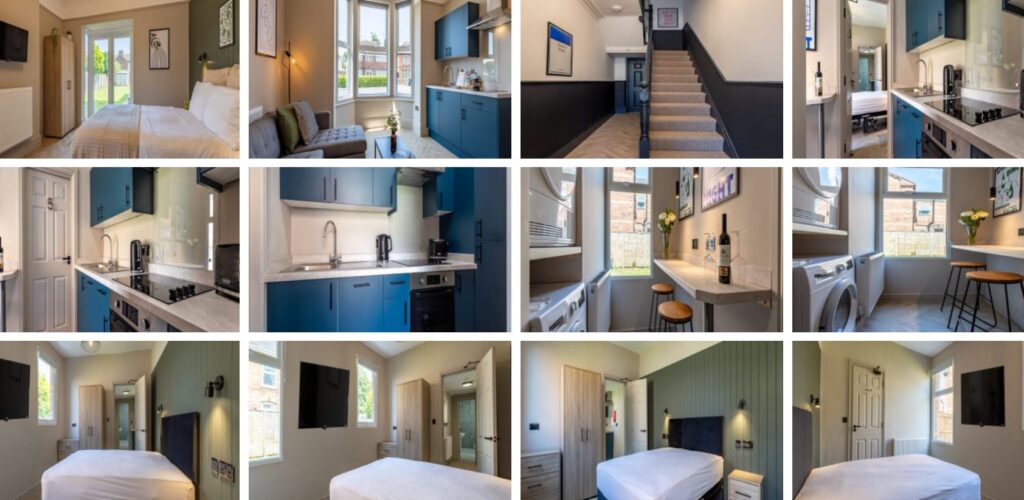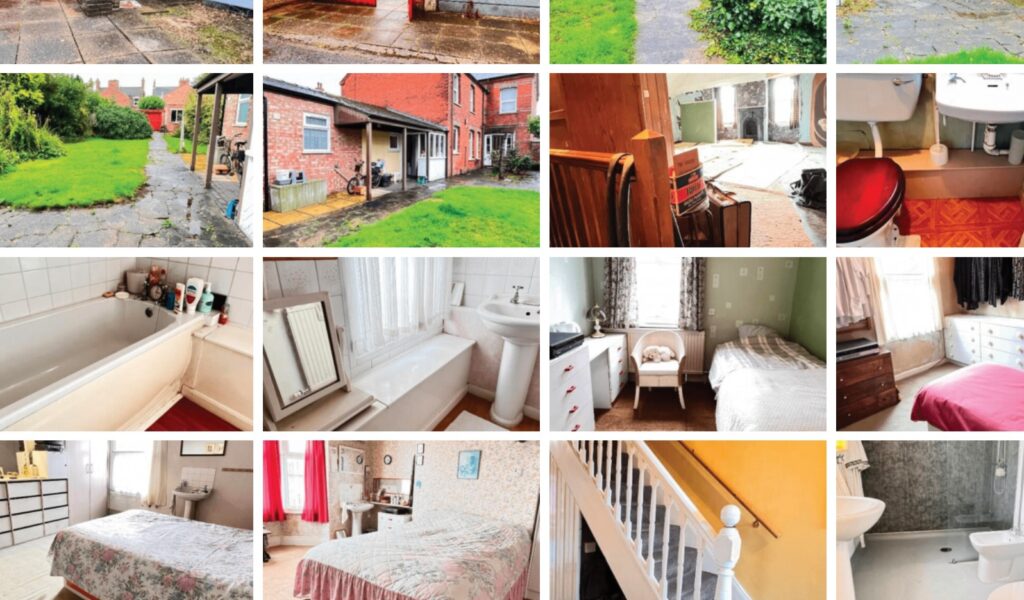Tom Barrett will not have to pick up the bill for a planning appeal – which incidentally he lost – after an inspector slammed Fenland District Council and ordered them to pay full costs for ‘vague and generalised’ objections and ‘unreasonable behaviour’.
Mr Barrett bought 41 Queens Road, Wisbech, for £230,000 in September 2023 and applied to turn it into an 8-bedroom HMO (House in Multiple Occupancy).
Although council officers recommended it for approval, the planning committee of Fenland Council refused it, and the Planning Inspectorate has sided with the council when Mr Barrett appealed.
However, Harry Wagstaff, the planning inspector, has awarded full costs to Mr Barrett after explaining to councillors their reasons for refusal fell well short of the standards required.
In the meantime, and before the outcome of the appeal was known, Mr Barrett went ahead and converted the house into six luxury studio apartments, the maximum number allowed without the need to comply with HMO regulations.
In his costs decision Mr Wagstaff said the original application by Mr Barrett had been for an HMO of a maximum of 8 bedrooms for a maximum of 12 people, including off road parking and demolition of an existing garage to create a better access.

“The application for an award of costs is allowed,” ruled Mr Wagstaff. He said parties in planning appeals normally meet their own expenses.
“However, the Planning Practice Guidance (PPG) advises that costs may be awarded against a party who has behaved unreasonably and thereby caused the party applying for costs to incur unnecessary or wasted expense in the appeal process,” he said.
“Unreasonable behaviour on the part of a council may include failure to produce evidence to substantiate each reason for refusal or vague, generalised, or inaccurate assertions about a proposal’s impact which are unsupported by any objective analysis.
“The costs application is made on the basis that the council has acted unreasonably in refusing planning permission. The applicant suggests that the planning committee failed to have regard to planning law and the recommendation of the planning officer to approve the application.
Fenland Council guilty of ‘unreasonable behaviour’ and ordered to pay costs
“Furthermore, the applicant contends that the reasons for the council’s decision are not at all obvious and are difficult to comprehend with inaccurate and incorrect assertions made which overstate and exaggerate the harm identified with no evidence or rationale to justify their reasoning.”
Mr Wagstaff said the council was entitled to take a decision contrary to the advice of its professional officers and that in itself is not grounds for an award of costs.

“However, in any appeal the council must produce evidence to substantiate its decision,” he said.
“The council’s statement of case draws attention to the committee report and subsequent planning committee minutes as forming the main arguments behind the council’s decision to refuse the planning application.
“Given that the officer recommendation in the committee report was to approve the planning application, this clearly does not constitute evidence that substantiates the council’s reasons for refusal.
EXCLUSIVE: Fenland folly lands council tax payers with whopping £35,000 bill
“Moreover, the planning committee minutes summarise the general discussions and do not set out the reasons with any clarity or precision.
“Notably, the minutes also suggest that the council’s legal officer advised that the council would have difficulty in defending a claim for costs in the event of an appeal should their reasons not be demonstrated with evidence, given the response from consultees.”

He said that in the absence of an objection from the local highways authority or any substantive technical or expert evidence to demonstrate risks to identify highway safety risks or a shortage of parking in the area including any shortfall in any relevant parking standards “the council has failed to substantiate how the appeal proposal would result in any highway safety issues referred to in reason
“Whilst the council’s statement of case refers to the effect of the provision of parking spaces, it fails to explain precisely why the council consider this would be harmful to the built environment as referred to.”
And Fenland Council had “not substantiated what they meant by ‘limited amenity space’ or what ‘the noise and disturbance impacts’ would consist of within their statement of case.
“Therefore, the council’s decision is vague and generalised. Whilst the reasons for refusal reference development plan policies, this alone is not sufficient to identify any site-specific harm identified.
“Moreover, whilst I have dismissed the appeal, my assessment was based on all of the evidence available to me including my own observations on site, the submitted plans and the comments received from all interested parties.
“This does not excuse the council from the need to clearly substantiate its decision.
“Therefore, unreasonable behaviour resulting in unnecessary or wasted expense has occurred and an award of costs is warranted.
“I conclude that unreasonable behaviour by the council has been demonstrated.
“Consequently, the application for a full award of costs is approved.”
Mr Wagstaff said his main reason for rejecting the appeal was that he felt an 8-bedroom HMO “would not provide adequate living conditions for occupiers particular regard to the provision of internal and communal space”
In this respect it would conflict with council policies which “seek to facilitate the health and wellbeing of Fenland residents by promoting high levels of residential amenity and by delivering and protecting high quality environment”.
Mr Wagstaff did not accept the reasons for refusal put forward by the council, and said the proposed development would not result in harm to the character and appearance of the area with particular regard to the provision of off-street parking spaces.
Parking in the area is largely unrestricted, and it is not a controlled parking zone, and he said many of the neighbouring houses benefit from private off-street parking.
“Although just a snapshot in time, during my site visit multiple on-street parking spaces were available a short walk away from the appeal site,” he said.
“Even in places where unrestricted street parking does occur, there is no evidence to suggest this obstructs the free flow of traffic.”
He added that the council confirmed there are no parking standards for HMO’s in the Local Plan although they suggest 8 off-street parking spaces should be provided.
“Substantive technical or expert evidence to support this figure or a parking survey to demonstrate a shortage of parking in the area contrary to my observations on site have not been provided,” he said.
“Occupiers of the HMO may not all be car owners. Neither would car ownership need to be relied upon given the appeal site is located within walking distance of the town centre which could adequately cater for day to day needs for services and facilities.”
Mr Wagstaff added: “There is no objective evidence to reach a different view or to suggest the proposed development would result in an unacceptable impact on highway safety or result in increased parking on double yellow lines which is a matter that can be enforced by non-planning mechanisms.”
His main concern was the living conditions although he agreed with Mr Barrett that the council housing officers had not disputed the fact the accommodation would meet HMO guidance for guidance for landlords and agents in relation to minimum bedroom sizes and other amenities.
“However, no precise breakdown as to what the full requirements are e.g. in relation to communal spaces, have been provided,” he said.
“Whilst the proposed development would also need to be subject to licensing requirements, such compliance with this and other standards does not necessarily mean that it would from a planning perspective function well or provide a high standard of amenity.”
He concluded that the use of No 41 as an 8 person HMO could lead to increased comings and goings as unrelated adults living there would have fewer shared activities and more visitors than would be associated with a single household.
Mr Wagstaff felt there was the potential for noise to harm the living conditions of adjacent occupiers “in addition to the noise and disturbance arising from increased comings and goings”.
He added: “Whilst concerns in relation to increased levels of anti-social behaviour, fear of crime, safeguarding issues, security, drug use, potential for odour, rodents, waste, and litter have been raised, the appellant has suggested that the HMO would be managed by the landlord.
“There is no objective evidence before me to suggest that the proposal would result in such issues provided that it would be properly managed. Even so, this does not address the other harm identified.
“I conclude that the proposed development would have an unacceptable effect on the living conditions of neighbouring occupiers with particular regard to noise and disturbance.
“Whilst the case officer recommended approval of the application, the council is not bound by the recommendation of their officers, nor am I.”
FACT FILE
Barrett Properties describes itself as “an innovative and professional property development business, Barrett Properties have earned a reputation for delivering high-quality projects.
“Calling on the experience and dedication of a close-knit team of specialists, we’re able to channel our expertise into projects we believe in, creating places we’re proud of.
“We acquire and develop dilapidated properties in Wisbech, Peterborough, Boston, and surrounding areas. Upon build completion we either chose to add the asset to our diverse rental portfolio of high quality, well maintained and high yielding, aspirational rental homes, or we place the property on the sales market, typically marketing and selling to investors or first time buyers”.



















